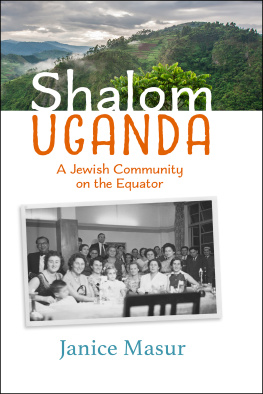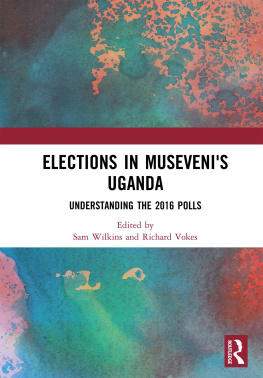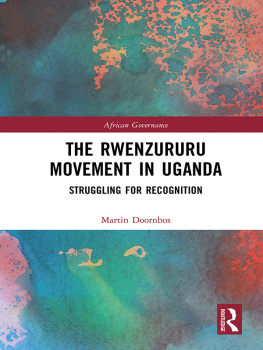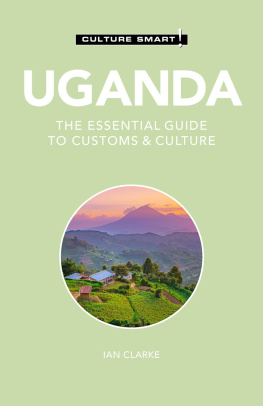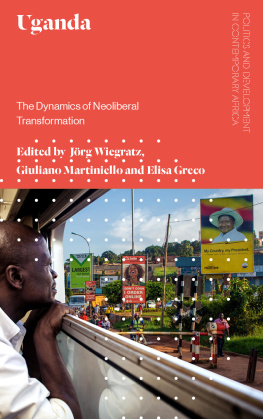Women, Mission and Church in Uganda
This volume recounts the experiences of female missionaries who worked in Uganda in and after 1895. It examines the personal stories of those women who were faced with a stubbornly masculine administration representative of a wider masculine administrative network in Westminster and other outposts of the British Empire. Encounters with Ugandan women and men of a range of ethnicities, the gender relations in those societies and relations between the British Protectorate administration and Ugandan Christian women are all explored in detail. The analysis is offset by the authors experience of working in Uganda at the close of British Protectorate status in the 1960s, employed by the Uganda Government Education Department in a school founded by the Uganda Mission.
Elizabeth Dimock is Honorary Research Fellow in the History Programme at La Trobe University, Australia.
Routledge Studies in Modern British History
For a full list of titles in this series, please visit www.routledge.com
8 Disability in Eighteenth-Century England
Imagining Physical Impairment
David M. Turner
9 British Student Activism in the Long Sixties
Caroline M. Hoefferle
10 Philanthropy and Voluntary Action in the First World War
Mobilizing Charity
Peter Grant
11 The British Army Regular Mounted Infantry 18801913
Andrew Winrow
12 The Chartist General
Charles James Napier, The Conquest of Sind, and Imperial Liberalism
Edward Beasley
13 The Great Church Crisis and the End of English Erastianism, 18981906
Bethany Kilcrease
14 Opening Schools and Closing Prisons
Caring for Destitute and Delinquent Children in Scotland 18121872
Andrew Ralston
15 Charles Pelham Villiers
Aristocratic Victorian Radical
Roger Swift
16 British Politics, Society and Empire, 18521945
Essays in Honour of Trevor O. Lloyd
David W. Gutzke
First published 2017
by Routledge
2 Park Square, Milton Park, Abingdon, Oxon OX14 4RN
and by Routledge
711 Third Avenue, New York, NY 10017
Routledge is an imprint of the Taylor & Francis Group, an informa business
2017 Elizabeth Dimock
The right of Elizabeth Dimock to be identified as author of this work has been asserted by her in accordance with sections 77 and 78 of the Copyright, Designs and Patents Act 1988.
All rights reserved. No part of this book may be reprinted or reproduced or utilised in any form or by any electronic, mechanical, or other means, now known or hereafter invented, including photocopying and recording, or in any information storage or retrieval system, without permission in writing from the publishers.
Trademark notice: Product or corporate names may be trademarks or registered trademarks, and are used only for identification and explanation without intent to infringe.
British Library Cataloguing-in-Publication Data
A catalogue record for this book is available from the British Library
Library of Congress Cataloging-in-Publication Data
Names: Dimock, Elizabeth, author.
Title: Women, mission and church in Uganda : ethnographic encounters
in an age of imperialism, 18951960s / Elizabeth Dimock.
Other titles: Routledge studies in modern British history ; v 16.
Description: New York : Routledge, 2017. | Series: Routledge studies in
modern British history ; v 16 | Includes index.
Identifiers: LCCN 2016048339 | ISBN 9781138228344 (hardback : alk. paper) |
ISBN 9781315392745 (ebook)
Subjects: LCSH: Church Missionary Society. Uganda MissionHistory. |
Women missionariesUgandaSocial conditions20th century. |
WomenUgandaSocial conditions20th century. | Missions,
BritishUgandaHistory20th century.
Classification: LCC HQ1797 .D56 2017 | DDC 305.432660234106761dc23
LC record available at https://lccn.loc.gov/2016048339
ISBN: 978-1-138-22834-4 (hbk)
ISBN: 978-1-315-39274-5 (ebk)
Typeset in Bembo
by Apex CoVantage, LLC
I am grateful for the continuing support of La Trobe University over many years, for grants for fieldwork that enabled me to visit libraries and institutions in England and Uganda and funding for the Borchardt library to purchase CMS archives on microfilm of the Uganda Mission for the period 19141935. Academic staff and postgraduates in the History programme have been a source of intellectual stimulus, and I gained much from seminars on theory and method and from a Feminist History reading group, along with specific criticism of my work. The winds of change blew postmodernism through History during my doctoral candidature, and I particularly acknowledge the inspiration gained from the late Emeritus Professor Rhys Isaac. I thank Professor Diane Kirkby for her early encouragement to publish in the area called Dealing with Difference. I owe many thanks to Drs Cheryl Crockett and Lee-Ann Monk for reading recent chapters of this volume; to them and to my colleagues Yvonne Ward and Janet Butler, thank you for your friendship and continued encouragement. Dr Apollo Nsubuga Kyobe assisted me with the translation of documents in Luganda, for which I am most grateful. I have had considerable help from staff in the Borchardt library, and thank Eva Fisch who has been a continuing source of support.
Dr David Dorward attempted to keep me on a steady course in supervising my doctoral research, and I am deeply indebted to him; his knowledge of African history has been invaluable. I take full responsibility, however, for the production of this volume.
In Uganda, the National Council for Science and Technology and the Presidents Office gave permission for my research project, and the Maker-ere Institute for Social Research (MISR) gave me affiliation and access to the Makerere University Library. Amos Rwabera (MISR) translated letters from Luganda. There were many who helped to make my brief period of fieldwork satisfactory. The late Bishops Amos Betungura and Akisoferi Wesonga drove me around their dioceses enabling me to interview people. The late Bishop Misaeri Kauma encouraged me, and I am appreciative of the late Archbishop Yona Okoth who allowed me to use the archives of the Church of Uganda at Namirembe. I was able to use the library at Mukono College. The principal of Gayaza Girls High School, Ruth Kavuma, allowed me to use the schools historical records, and I was able to discuss the schools history with staff members; I also thank Victoria Kisarale, Head Teacher in 2016, for further allowing the use of historical photos. The headmistress of Kyebambe Girls School in Toro allowed me to use school archives. Helen Wangusa, the Mothers Union worker for the Province of Uganda, helped me to locate women who had been associated with the Mothers Union some decades ago. It was most pleasurable interviewing women and men about the early history of the Church of Uganda, their experience as members of the Church and their memories of, and friendships with female missionaries. These included Elsie Kajubi, Deborah Kiwanika, Norah Pande, Yemima Sajjabi, Florence Nekyon, Ruth Nsubuga, Christine Sebaduka, Lillian Mukwaya, Eresi Muntukwonka, Mrs Bikangaga, Erina Kigozi, Geraldine Sabiti, Betty Kanyamunyu, Mrs Magali, Marjorie Kabuzi, Grace Bwayo, Ruth Baddakwaya, Janet Wesonga, Canon A. J. Binaisa, Eridade Mulira, Ananias Murumba, Eriasa Mugimba, many of whom are now deceased. I thank them, or their families, all.


